A rodeo filled with cowboys shows the strength of agriculture in Brazil
The annual festival gathers a million people in the countryside of São Paulo, embodying the power of the national economic engine
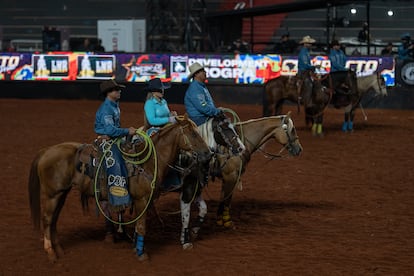

Three cowboys – the favorites to win the championship – pull their wide-brimmed hats across their chests. They’re illuminated by a barrage of fire in a twilight horseshoe-shaped stadium. Kneeling on the sand, they – along with the spectators – say a prayer that the announcer recites. The national anthem plays and the competitors withdraw. And, soon afterwards, Bruce Springsteen roars out of the speakers, singing “Born in the USA”. A door opens and a cowboy appears on the back of a huge bull, who leaps with enormous force. Now, finally, the show begins.
We are in the rodeo capital of Brazil. If the announcer and the rest of the audience weren’t speaking Portuguese, this could be Texas. Every August, a city about 300 miles from São Paulo called Barretos celebrates the largest rodeo festival in Latin America. It’s a party that magnificently embodies the strength of Brazil’s countryside. The main national economic engine – agriculture – accounts for 25% of Brazil’s GDP.
This festival is dedicated to those who labor on the dairy farms. It receives more than a million visitors in ten days at the end of August, reflecting the power of central and western Brazil. These inland regions have a very different culture from that of the coast, which gave birth to bossa nova and samba. Miss Rodeo 2023 – Danielle Macedo, a 26-year-old lawyer – walks around the venue, sporting a heart-stopping miniskirt, two-tone boots and an embroidered Our Lady of Aparecida (the patron saint of Brazil) on her hat. Here, sertaneja music – the Brazilian version of country music – cowboy hats, large belt buckles, Wrangler jeans, huge crucifixes, conservative values and the traditional family triumph.
This is the festive face of the most dynamic part of Brazil – the part of society that is growing the most, in terms of income and population. The ranching region generates employment and demands labor while, politically, it’s trying to find its feet after the electoral defeat of Jair Bolsonaro, 68, who, at the height of his power, was an invaluable ally of agribusiness.
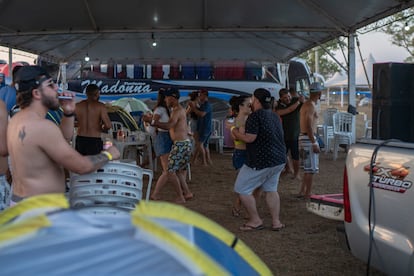
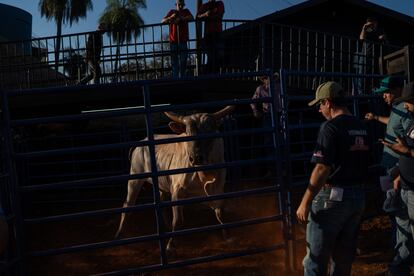
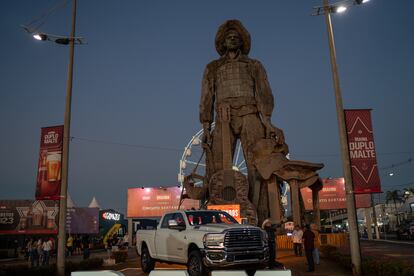
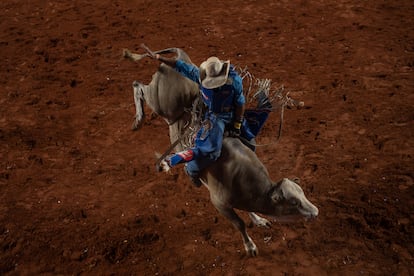
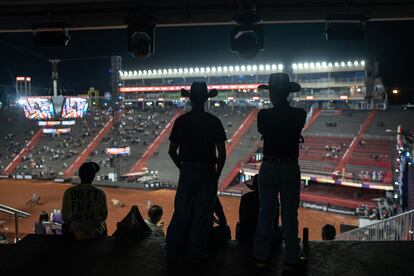
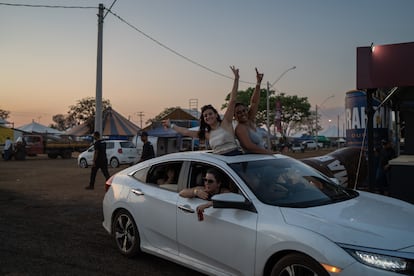
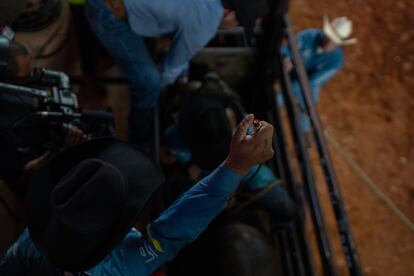
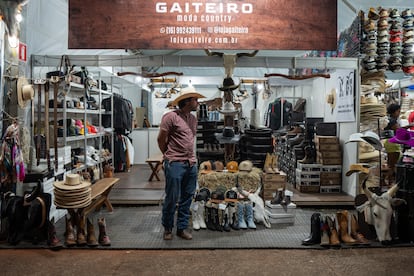
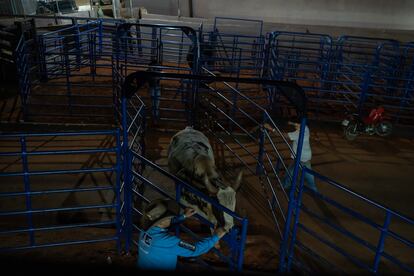
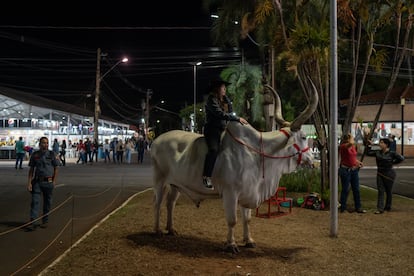
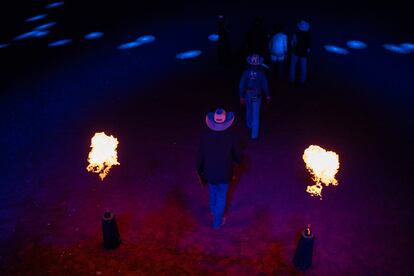
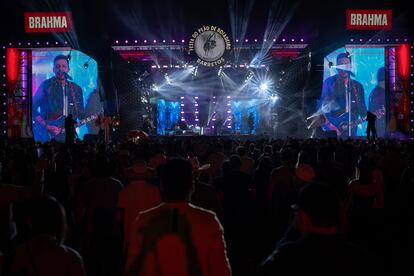
Eight seconds is the magic number in the rodeo. To get on the scoreboard, the rider must remain mounted on the bull for eight seconds, holding on with one hand, with the other forbidden from touching the animal. “Sometimes people say… eight seconds? That’s so little! But if you’re up there, it feels like forever,” explains Sebastián Procopio, 64, the first Brazilian to go to the United States to ride bulls. Procopio is one of the judges for the rodeo in Barretos. “If agriculture isn’t doing well, the rodeo isn’t doing well, because the competitions are usually organized by agricultural unions, exhibitions, fairs,” he points out.
In the past three decades, Brazil’s agricultural area has doubled and production quintupled. Some 26% of the country’s 3.3 million square miles (including parts of the Amazon) are pastures. Crops occupy 9% of this land, according to data published by the Folha de S. Paulo newspaper. A giant leap, which occurred with state support. However, the sector operates with far fewer subsidies compared to those granted in other global agricultural powers.
In the 1960s, Brazil’s public agricultural research institute – Embrapa – sent hundreds of agronomists to the best universities in the world. With this accumulated knowledge – along with the Chinese appetite for soybeans and beef – a powerful sector arose. However, the ranchers and farmers complain of being treated like a bunch of ignorant townspeople by the urban elites. They explain that they are an army of entrepreneurs who have achieved tremendous success with their farms and factories. They boast of using technology and drones to fumigate crops.
For 2,990 reais ($600), you can get an exclusive entry to the VIP box at the Barretos Festival. But, for as little as 20 reais ($4), you can attend the rodeo. At the festival, there’s no shortage of slogans against homophobia, in favor of respect for differences, or nods to the defense of the environment. The organizers know that, when it comes to ecological matters, the world is increasingly picky about what it buys. Illegal deforestation and emissions from more than 200 million cattle are the worst threat to the Amazon.
Popular taste for the rodeo caught on in Brazil half-a-century ago, thanks to a film called Junior Bonner, starring Steve McQueen and directed by Sam Peckinpah. For inland Brazil, this event is the equivalent of Carnival, the highlight of the year along the coast.
The festival has given Barretos – a city of 122,000 people – national fame. It has never stopped growing. The first edition – which took place back in 1956 – was held under a tent borrowed from a circus. The champion took home a television. By the 1980s, riders substituted jeans for traditional cowboy pants. Today, the grand prize is paid out in dollars and includes a spot to compete in Texas. The current site – about 21 million square feet in total – contains a stadium, five stages, a Ferris wheel, bumper cars, a playground, shops and food stalls. And yet, it has become too small. Alcohol circulates in large quantities. No weapon is allowed on the premises and – to minimize the risks in the event of a fight – some restaurants replace cutlery with chopsticks
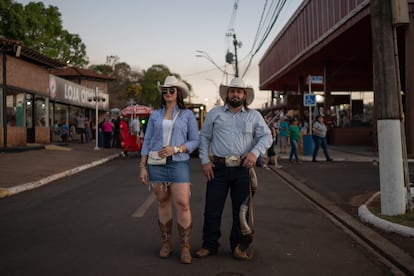
A couple – freshly groomed – strolls among the shops and food stalls as the sun goes down. The Hubners have driven for two days to get here from Juína, a small city in the state of Mato Grosso. “It’s a little past the end of the world,” Felipe, the husband, jokes. It took them some 1,200 miles of highway to enjoy the great annual rodeo event in the country.
Juína is a good illustration of the boom experienced by the central and inland regions of Brazil. Fueled by the cattle and timber trade, the city has grown spectacularly in less than a decade: “Until 2014, it had about 35,000 inhabitants. Now, it’s around 50,000,” emphasizes Felipe Hubner, 35. In that same period of time, the population of Mato Grosso and other agricultural states shot up by 20%, according to the latest national census.
Felipe comes to enjoy the rodeo – years ago, he used to ride bulls. His wife, Karine Hubner, 27, likes the show, but she’s more attracted to the massive concerts of sertaneja music: duets that sing about love, heartbreak and rural culture. A style that, in recent years, has conquered the rest of Brazil, becoming the most popular genre of music.
Unlike much of the party crowd, Hubner agrees to talk politics. He soon makes it clear that he doesn’t like incumbent President Luiz Inácio Lula da Silva – who last held office from 2003 until 2010 – and his government at all. “Since the farmers didn’t vote for [the Workers’ Party], they’ve come at us with a knife in their mouths. First, they encourage land invasions (when squatters occupy private property); second, they cut 80% of the financing [to the agricultural sector]; third, interest rates for agriculture have risen and fourth, they have a failed export policy. A sack of soybeans – which was priced at 200 reais ($40) – is now at 100. [A bushel] of corn has dropped from 90 to 35 reais (from $18 down to $7).”
Marcos Abud – one of the directors of the festival – stresses that the organizing entity is apolitical. Every president of Brazil and governor of São Paulo has been invited since the festival began, regardless of political color. The fact is that Lula, 77, has never participated in this festival, which was founded almost seven decades ago in order to collect donations for charity, especially for the Hospital del Amor, in Barretos, a major cancer center.
Former President Bolsonaro, on the other hand, hasn’t missed his standing appointment with the Barretos Rodeo Festival. Even now that he’s out of the presidency – as well as disqualified from seeking office and involved in multiple court cases – he still showed up. This past Friday, the municipality – where he won two-thirds of the votes in the 2022 elections – made him an honorary resident. Later, at the rodeo, he was cheered by thousands of people who filled the stadium built by the architect (and communist militant) Óscar Niemeyer in the 1980s, to be a “sanctuary of backcountry culture.”
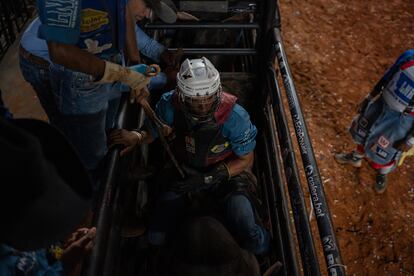
They say that Brazil is – after the United States – the great power in the world of rodeo, with 13 world champions. The cowboys – who are very professional – train and eat like elite athletes. Miraculously, their wide-brimmed hats don’t fall off when the bull jolts them around (although many riders have adopted a helmet reminiscent of those used in American football). No one jumps into the ring without a dental protector and a rigid vest. But who really watches over the cowboys are the lifeguards – characters who, long ago, were clowns meant to entertain the public during breaks. Their mission gradually evolved to ensuring that the 2,000-pound bulls don’t step on the cowboys or ram into them after shaking them off their backs.
Clearly, the pressure of animal rights groups has rattled the Barretos Festival. As soon as they have the opportunity, many of those interviewed at the rodeo claim that they support the welfare of the animals. Some even question this journalist from EL PAÍS, pointing out that bullfighters still kill bulls in Spain and asking if anyone protests. This debate is also hot across Latin America.
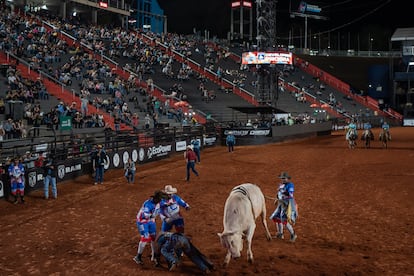
“Look, we’re from the countryside. Many Brazilians like soccer, the beach… but since we don’t have the sea, rodeo is our sport,” explains Víctor Marcus, 27, who happily agrees to talk about Bolsonaro and Lula. “It’s not that Bolsonaro is different – it’s that he’s better at everything. He defends the [traditional] family and religious values that I grew up with. He gave us the ability to obtain loans, he improved security. I got my weapons license [during his tenure]. When you live on a farm, there’s little security. You call the police and they don’t come.” He came from Jardinópolis – located 90 miles away from Barretos – with his wife, his baby, a friend and his wife. The group has settled in the campsite for 10 days. There, among tents and caravans, a group of 70 friends – who arrived by bus from Belo Horizonte – dance forró.
After dark, a young man waits with his wife and baby for the first bull to jump into the ring. He compares the Brazilian and American rodeos. With a map of Texas printed on his shirt and the word “patriot” engraved on his belt buckle, he says that he has competed in both countries… although the prizes in the US are more juicy. And, with a smile, he points out another big difference: “Here we usually say, jokingly, that Brazilians have a lot to learn about rodeo from the Americans… but Americans have a lot to learn from our parties. There, the rodeo ends and everyone goes home. Here, we continue to party.” The coolness of the night is the perfect complement to indulge in dancing and singing until dawn.
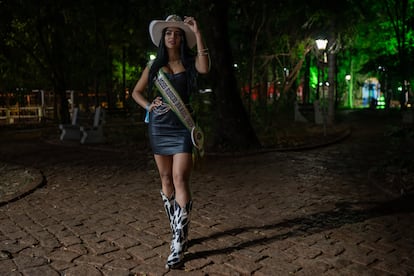
Sign up for our weekly newsletter to get more English-language news coverage from EL PAÍS USA Edition
Tu suscripción se está usando en otro dispositivo
¿Quieres añadir otro usuario a tu suscripción?
Si continúas leyendo en este dispositivo, no se podrá leer en el otro.
FlechaTu suscripción se está usando en otro dispositivo y solo puedes acceder a EL PAÍS desde un dispositivo a la vez.
Si quieres compartir tu cuenta, cambia tu suscripción a la modalidad Premium, así podrás añadir otro usuario. Cada uno accederá con su propia cuenta de email, lo que os permitirá personalizar vuestra experiencia en EL PAÍS.
¿Tienes una suscripción de empresa? Accede aquí para contratar más cuentas.
En el caso de no saber quién está usando tu cuenta, te recomendamos cambiar tu contraseña aquí.
Si decides continuar compartiendo tu cuenta, este mensaje se mostrará en tu dispositivo y en el de la otra persona que está usando tu cuenta de forma indefinida, afectando a tu experiencia de lectura. Puedes consultar aquí los términos y condiciones de la suscripción digital.








































